OCZ Vertex 3 (240GB) Review
by Anand Lal Shimpi on May 6, 2011 1:50 AM ESTRandom Read/Write Speed
The four corners of SSD performance are as follows: random read, random write, sequential read and sequential write speed. Random accesses are generally small in size, while sequential accesses tend to be larger and thus we have the four Iometer tests we use in all of our reviews.
Our first test writes 4KB in a completely random pattern over an 8GB space of the drive to simulate the sort of random access that you'd see on an OS drive (even this is more stressful than a normal desktop user would see). I perform three concurrent IOs and run the test for 3 minutes. The results reported are in average MB/s over the entire time. We use both standard pseudo randomly generated data for each write as well as fully random data to show you both the maximum and minimum performance offered by SandForce based drives in these tests. The average performance of SF drives will likely be somewhere in between the two values for each drive you see in the graphs. For an understanding of why this matters, read our original SandForce article.
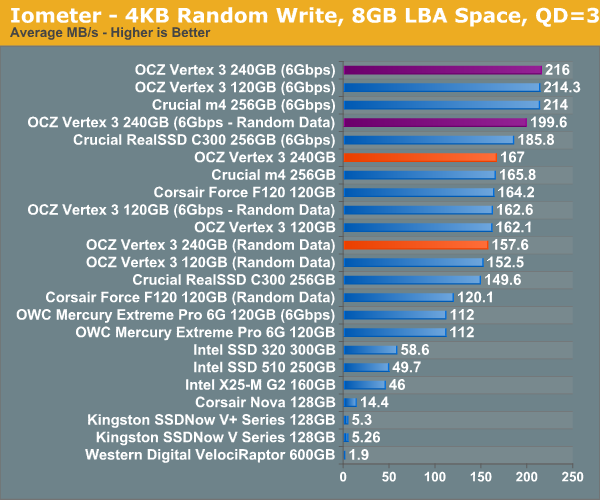
Many of you have asked for random write performance at higher queue depths. What I have below is our 4KB random write test performed at a queue depth of 32 instead of 3. While the vast majority of desktop usage models experience queue depths of 0 - 5, higher depths are possible in heavy I/O (and multi-user) workloads:
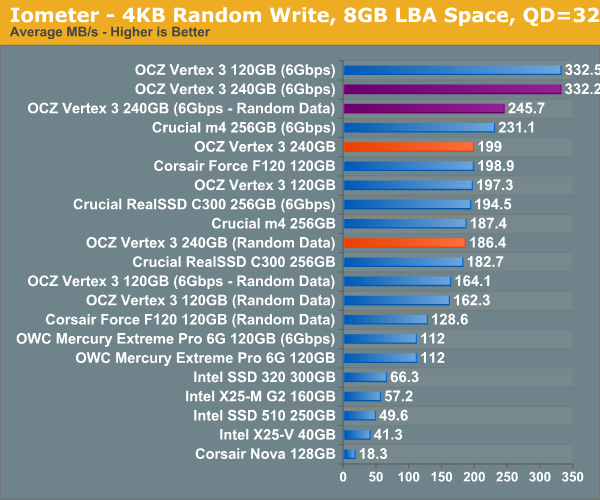
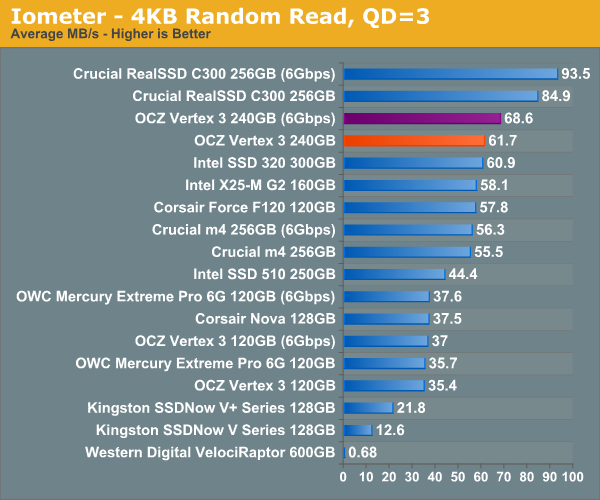
Sequential Read/Write Speed
To measure sequential performance I ran a 1 minute long 128KB sequential test over the entire span of the drive at a queue depth of 1. The results reported are in average MB/s over the entire test length.
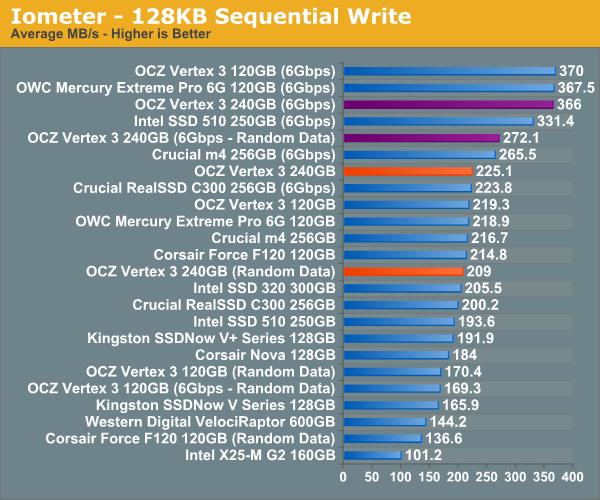
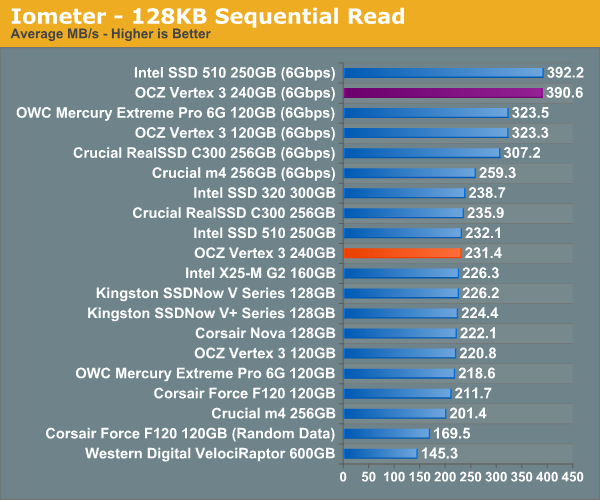










90 Comments
View All Comments
spudit99 - Friday, May 6, 2011 - link
Because these drives are so new and right on the cutting edge, this is probably not going to happen. The enthusiast community is going to do be doing this job for them, letting them both sell drives and fix issues along the way. I'm still mucking around with a year old CS300 that took months to get running as desired....Anand went through the same debacle.if you are looking for a super stable SSD with a wide compatiblity range, the OCZ Vertex 3 probably is not the best choice. I would suggest either Samsung or Intel SSD's if stability is key.
sor - Friday, May 6, 2011 - link
Unfortunately there seems to be some sort of incompatibility between Linux and the Vertex 3. Specifically newer kernels, such as most recent versions of ubuntu. Symptoms include the disk not being found on boot about 80% of the time.From the logs and reports, it looks like the disk doesn't return from the ATA 'identify' command the way linux expects it to. It's a real bummer for me since Linux is more than just a hobby, at this point I've got a 240G Vertex 3 that I can't return for anything but a replacement. Wish I would have just gone with a C300/M4, or 520.
http://www.ocztechnologyforum.com/forum/showthread...
https://bugs.launchpad.net/ubuntu/+source/linux/+b...
sor - Friday, May 6, 2011 - link
I should add that we use hundreds of SSDs at work. We deploy maybe 8-10 a week. We've been eagerly awaiting the new Sandforce controllers to come out in order to try to use them in our servers, but since they don't play nice with Linux it's out of the question. Maybe another brand would work, but my impression was that the firmwares are mostly the same and come from Sandforce.DanaG - Friday, May 6, 2011 - link
If the Vertex 3 is anywhere near as buggy as the Vertex 2, I don't want one.It seems the drive can't handle ATA Security, even though it claims support for it. The drive fails to respond if given non-data (such as "unlock") commands after resume from suspend!
http://www.ocztechnologyforum.com/forum/showthread...
jcompagner - Saturday, May 7, 2011 - link
ah, then this is what i had with an older driver of intelBSOD always when resuming
The latest driver of intel i don't have that problem anymore but i guess that now doesn't send that command or something
But yes i already told OCZ at there forum that they really should look into this, that it is not a real driver issue (yes the driver can fix it by not sending those commands) but it is really an issue that the Vertex 2 or 3 doesn't really work well with all the sata commands, i think many problems reported by many peoples are all coming down to that.
OCZ/Sandforge should really really be looking into that!
DanaG - Monday, May 9, 2011 - link
For me, it's not the driver doing it -- the same happens in both Windows and Linux. It's my laptop's firmware that's sending "non-data commands".How can you claim to "support" ATA Security if the drive becomes unresponsive when told to unlock? If you suspend with drive locked, you can be nearly 100% certain you'll want to unlock the drive at resume.
For some people, it doesn't even take lock/unlock to make the drive crap out -- perhaps the BIOS calls an IDENTIFY command, or such.
Anand, can you please try to get OCZ and/or Sandforce to do something about this buggy firmware? My old Indilinx drive handled suspend/resume (while locked) perfectly fine!
Check out that forum post for info on how to reproduce the issue.
danjw - Friday, May 6, 2011 - link
I am considering switching to an SSD on my desktop. Currently, I have a regular defrag scheduled via windows scheduler. Should I get rid of this for an SSD?evilspoons - Friday, May 6, 2011 - link
Yes, definitely. The Intel SSD toolbox actually does this automatically if it detects a scheduled defrag.Spacecomber - Friday, May 6, 2011 - link
I know that you've got your hands full with keeping up with reviewing the individual SSD models that are being released, Anand, but I think it would be helpful if you or another writer could put together a guide or overview of this hardware segment for someone thinking to take the plunge into a SSD for their system.Things that I would be interested in are bang for your buck comparisons, which types of drives would be the best match for particular usage scenarios, and which drives are likely to be the easiest to adapt to and most trouble free to use.
As I think you suggested in an earlier comment (re: vertex 2 vs vertex 3), a lot of the differences between these drives covered in these detailed reviews are not necessarily differences that can be readily detected in actual use, and the big difference is between a normal HDD and a SDD. Yet, I don't think that this means we are at a stage where you simply look for the least expensive SSD that has the capacity you want (which seems to be pretty close to the case when it comes to HDDs, these days).
I've read these SDD reviews with varying degrees of scrutiny, since I'm not necessarily ready to buy one right now. If I had to simplify what I've taken away these reviews, so far, into a rule of thumb, it would be to buy the largest capacity Intel drive that I could afford. Of course, I may be way off base in reaching that conclusion, which is why I would be interested in a guide.
spudit99 - Friday, May 6, 2011 - link
Company I work for has deployed several SSD's in laptops especially. Samsung and Intel drives have been trouble free, although not always at the very top of speed list.Best advice I can give is find a good buy and try one out. My personal experience is extremely positive, even with the 2+ year old SSD drive in my laptop. Yes, the cost is high, but IMO the performance gain is hard to beat.
They are fast, quiet, and as long as you aren't trying to be the first to have the latest product, very reliable. The only SSD trouble I've had was with a personal purchase (CS300), which took a return and several firmware updates to fix. Reading about this stuff is great, but unless you want to pave the way, I would be at least somewhat conservative.